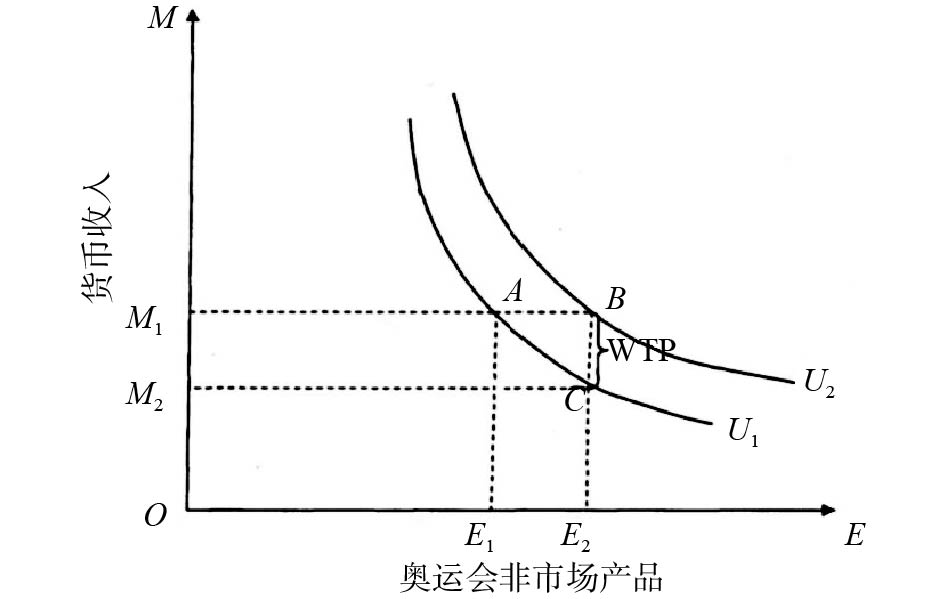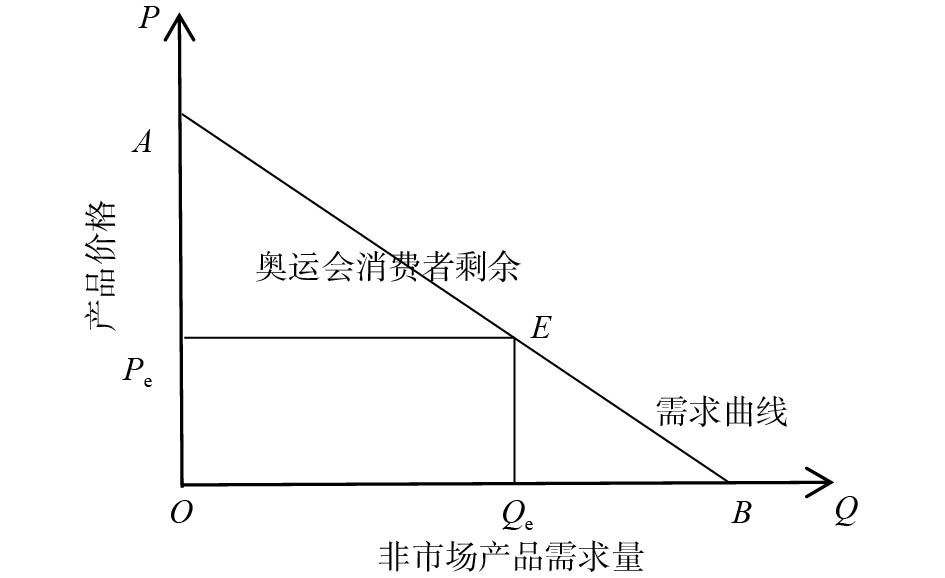Non-Market Value Evaluation of Olympic Games in Host CityTaking the Joint Olympic Bid of the Yangtze River Delta as an Example
-
摘要:
采用条件价值评估法,以长三角地区联合申办奥运会为假设情景,实证分析主办城市的奥运会非市场价值。结果显示:奥运会非市场价值是奥运会价值体系的重要组成部分,长三角地区跨区域联合办赛具有较好的群众基础,在设有赛事和没有赛事情境下长三角地区主办城市居民支付意愿均值为3139元/户和2971元/户,支付率为63.49%和50.44%;不同情境下不同城市居民的支付意愿水平存在差异,表明奥运会非市场价值存在城市间差异;4个城市的奥运会非市场价值总和为306.04亿~406.94亿元;“以纳税形式上交政府”是主办城市居民首选的支付方式;奥运会非市场价值的情感智力效应是主办城市居民支持长三角地区联合申办奥运会的主要动因;情感智力认同度和体育涉入度是最重要的影响因素,所在城市是否有赛事安排的影响也不容忽视。建议多措并举扩大奥运会非市场价值的积极效应,从多重路径提升奥运会申办的居民支持度。
Abstract:The non-market value of the Olympic Games of host cities is empirically analyzed by using the conditional value assessment method and taking the joint bidding of the Yangtze River Delta region for the Olympic Games as the scenario assumption. It is shown that the non-market value of the Olympic Games is an important part of the value system of the Olympic Games. The cross-regional joint hosting of the games in the Yangtze River Delta region have a good mass base. The residents' willingness to pay in the host cities of the Yangtze River Delta region with and without events is 3139 yuan/household and 2971 yuan/household, with payment rates of 63.49% and 50.44%, respectively. There are differences in willingness to pay among different urban residents under different scenarios, indicating that differences exist as for the non-market value of the Olympic Games among cities. The total non-market value of the Olympic Games in the four cities ranges from 30.604 billion yuan to 40.694 billion yuan. "To pay taxes to the government" is the preferred payment method for residents of the host city; the "emotional intelligence" effect of the non-market value of the Olympic Games is the main reason for the host city residents to support the joint bid of the Yangtze River Delta region for the Olympic Games; emotional intelligence identification and sports involvement are the most important influencing factors, and the influence of the city's event arrangement can not be ignored as well. It is recommended to take multiple measures to expand the positive effects of the non-market value of the Olympic Games and enhance the support of residents for the Olympic Games bid through multiple paths.
-
奥运会是奥林匹克运动众多活动中层次最高的活动,是赛事体系中能级最高的顶级赛事,具有促进城市发展和社会进步的功能[1]。申办及举办奥运会的组织工作十分庞杂,经费开支巨大,亦存在诸如2020年东京奥运会延期等难以预估的风险。奥运会经济收益有限,难以弥补办赛成本,加上赛事规模扩大等因素,跨区域联合办赛逐渐成为奥运会的重要办赛趋势。2022年北京冬奥会的成功举办体现了联合办赛的重要性[2]。与此同时,随着我国区域发展战略的不断演进和加快建设全国统一大市场重大部署的持续推进[3],长三角、粤港澳大湾区、京津冀以及成渝等城市群对通过联合举办奥运会等大型赛事以加快推进区域一体化进程的考量也不断增多。如何准确评估举办奥运会所涉及公共支出的合理性以赢得更多居民的理解与支持,以及如何扩大奥运会为主办城市带来的积极效应,依然是主办城市面临的重要课题。
传统奥运会的价值评价方法局限于奥运会市场价值的衡量,奥运会非市场价值的无形性以及难以被量化评估的特点使其往往被忽略。作为奥运会价值的重要组成部分,非市场价值的有效评估将有助于主办城市掌握举办奥运会所产生的真正价值,最终赢得更多支持。研究[4]发现,非市场价值评估方法一般分为揭示偏好法和陈述偏好法2类,前者基于真实市场数据,后者则通过构建假想市场实现价值评估。陈述偏好法又包括条件价值评估法、条件行为法和选择实验法。其中,条件价值评估法因能直接引出消费者关于非市场物品或服务的支付意愿或补偿意愿,同时可以根据各种政策条件变化设计不同的假设情景,被认为是评估公共产品价值最合适的方法。申办奥运会属于事前评估,已有国外学者[5-8]采用条件价值评估法对英国、德国、美国等申办奥运会的非市场价值评估展开研究。基于此,本文以长三角地区联合申办奥运会为假设情景,采用条件价值评估法,从主办城市的视角对奥运会非市场价值展开评估研究,以期为国内外相关研究和决策提供新的证据与参考。
1. 奥运会非市场价值评估的理论基础
奥运会非市场价值具有价值和非市场双重属性。奥运会为主办城市的经济与社会发展带来了积极效用[9],其满足城市居民欲望的能力以及城市居民对奥运会效用的主观心理评价形成了奥运会的价值。奥运会具有公共产品的性质[10],其非市场价值来源于奥运赛事为主办城市及城市居民所带来的不可用于市场交易的、没有明确界定市场价格的、不可以金钱衡量的效用价值,缺乏与可识别的现金流的联系。从主办城市的视角看,奥运会非市场价值界定为奥运会所表现的能够符合主办城市以及主办城市居民的物质需求或提供心理满足,但不可在市场上流通变现的积极意义和有用性,以提高居民福祉为落脚点[11]。它通常是无形的,表现为精神、心理、感知上的满足,居民是主体,奥运会是客体,主办城市是介质。考量主办城市的奥运会非市场价值,并以货币价值的形式加以表示,需了解居民消费者的内在行为机制。根据消费者行为理论,可以将奥运会视为主办城市居民所面对的可选择消费的生活产品之一,居民根据收入限制和消费者偏好做出行为选择。消费者偏好取决于居民对奥运会非市场价值的判断,反映效用水平。无差异曲线理论和消费者剩余理论可将奥运会非市场价值货币化和价格化,从而为主办城市居民的消费行为选择提供更为有效的决策依据。
1.1 奥运会非市场价值的货币化
奥运会非市场产品的价值性决定了其具有为居民带来一定效用的能力。奥运会非市场价值是主办城市居民对奥运会非市场产品效用的判断结果。奥运会非市场产品属于公共产品,具有外部性,决定了这一类效用不需要居民在现实市场上进行支付,但并不代表居民不愿意支付。福利经济学表明,补偿变差是衡量消费者剩余的重要指标,其使提供公共产品所带来的效用水平提高与货币收入减少所带来的效用水平下降相平衡。效用水平的改变可以用为使消费者的整体效用水平保持不变所需的货币量来表示。居民效用无差异曲线是2种产品的各种不同组合的点的轨迹,这些不同的产品组合使消费者始终获得相同的效用水平。该理论解释了消费者面对不同产品组合所做的选择行为,因此,可使用居民效用无差异曲线对居民的奥运会非市场产品的效用水平进行分析:将主办城市居民面对的商品组合分为奥运会非市场产品与其他产品(指除奥运会非市场产品之外的产品)2个类别;货币收入代表消费者的消费能力,消费者的消费能力集中体现在消费者在现实市场上可以购买的产品数量(即除奥运会非市场产品之外的产品数量),由此,可用货币收入代表奥运会非市场产品之外的产品。那么,主办城市居民面对的商品组合可以表达为奥运会非市场产品与货币收入,居民根据偏好做出行为选择。
在居民效用无差异曲线(图1)上,横轴表示奥运会非市场产品,纵轴则表示货币收入,对居民的奥运会非市场产品的效用水平进行分析,在假想市场上测量居民的支付意愿(WTP),实现奥运会非市场产品的价值货币化。越多的奥运会非市场产品或货币收入总能带给主办城市居民越多的效用,不管是奥运会非市场产品还是货币收入,主办城市居民总是偏好越多越好。因此,在同一效用水平上,奥运会非市场产品与货币收入是此消彼长的关系:选择更多的奥运会非市场产品,就要放弃部分货币收入;选择更多的货币收入,就要放弃部分奥运会非市场产品。根据消费者效用恒定理论,主办城市居民所放弃的一定的货币收入与获得的更多的奥运会非市场产品为其带来同等的效用水平,居民所放弃的一定的货币收入,即居民关于奥运会非市场产品的支付意愿代表奥运会非市场价值。
如图1所示,U1、U2代表2条无差异曲线,表示2种效用水平,每条无差异曲线上的每个点代表不同的货币收入与奥运会非市场产品的组合。假设居民的初始福利状况位于点A,即表示该居民在货币收入为M1时,享受的奥运会非市场产品是E1,效用水平是U1;点B代表居民在货币收入为M1时,享受的奥运会非市场产品是E2。点B的效用水平比点A要高,与点A相比,点B在同样的收入下享受奥运会所带来的更多的非市场收益。对于个体居民而言,当奥运会非市场产品从点A增至点B时,他愿意为此支付的货币为M1-M2;当该居民多支付货币M1-M2后,其货币收入减少,则居民的消费组合变为点C,这时效用水平状况与点A相同,位于同一条无差异曲线U1上。因此,M1-M2是居民为获得奥运会非市场产品所需的货币量。
1.2 奥运会非市场价值的价格化
奥运会非市场价值的效用水平可以用货币量表示,因此奥运会非市场价值具备一定的价格属性。消费者剩余又称为消费者净收益,指消费者在购买一定数量的某种商品时愿意支付的最高总价格(消费者价格)和实际支付的总价格(市场价格)之间的差额,是衡量消费者福利的重要指标。用奥运会消费者价格衡量主办城市居民从奥运会中获得的效用,遵循边际效用递减规律,曲线向右下方倾斜。第一单位的奥运会产品边际效用最大,消费者愿意支付的价格最高;最后一单位的奥运会产品边际效用最小,消费者愿意支付的价格最低,最终主办城市居民以最后一单位的价格购得所有单位商品,也因此从最后一单位商品之前的每一单位商品享受到剩余效用。奥运会产品市场价格遵循供求规律,取决于市场供给与需求的关系,可用于衡量主办城市居民为获得一定的奥运会效用所实际支付的货币。奥运会消费者价格与市场价格之差体现了主办城市居民从市场行为中获得的额外满足感或福利感的“消费者剩余”。奥运会非市场价值本质上是主办城市居民无法在市场上购买到的福利,消费者价格可能不为0,但实际价格为0。
奥运会所产生的消费者剩余由两部分内容构成:一部分是因产品市场价格低于消费者价格,使消费者从中得到额外的满足,如居民购买奥运会门票,假设门票市场价格为500元,居民消费者价格为700元,产生的消费者剩余为200元;另一部分是消费者价格大于0,市场价格为0,消费者无法支付价格,却可得到的非市场效用,如奥运会带来的节日氛围,假设居民消费者价格为100元,但居民所支付价格为0元,产生的消费者剩余为100元。此时的消费者价格即居民支付意愿,使主办城市奥运会非市场价值价格化。主办城市居民消费者剩余可以用产品需求曲线以下、价格线以上和价格轴围成的三角形面积表示。如图2所示,横轴OQ代表奥运会非市场产品需求量,纵轴OP代表奥运会产品价格,曲线AB代表需求曲线,曲线AB上的点代表个体居民在某一奥运会非市场产品数量上愿意支付的价格。Pe代表市场价格,从Pe出发画一条横线,与曲线AB相交于E点,其对应的需求量为Qe。Qe是个体居民在市场上以Pe的价格消费的奥运会非市场产品数量。图形OAEQe的面积为个体居民从奥运会非市场产品中获得的总效用,但实际支付的效用为OPeEQe的面积。三角形PeAE(OAEQe-OPeEQe)表示普通奥运会主办城市居民从奥运会中得到的额外效用,即为奥运会居民消费者剩余。
2. 奥运会非市场价值评估方法选择
如前所述,非市场价值的测量方法分为揭示偏好法和陈述偏好法2类。与基于真实市场的揭示偏好法相比,陈述偏好法通过虚拟市场的假设情景,以询问的方式从消费者的陈述中提取偏好信息,评估待估物品,特别适合在申办奥运会等事前评估事件中消费者市场偏好行为数据无法获得的情况下使用。陈述偏好法包括条件行为法、选择实验法和条件价值评估法3种。其中:条件行为法和选择实验法是通过消费者面对假想市场的行为决策而做出的评估;条件价值评估法直接引出消费者关于非市场物品或服务的支付意愿或补偿意愿,通过调查问卷的方式计算人们愿意为待估物品的改进支付多少货币,量化居民的支付意愿以得出其对公共物品的偏好,直接对公共物品的正外部性进行评估。
条件价值评估法是从Hicks[12]提出的等值变动(equivalent variation)与补偿变动(compensating variation)计量指标发展而来的评估非市场产品的技术方法。它以消费者效用恒定理论为依据,测量消费者效用水平的变化[13]。根据效用无差异曲线理论和消费者剩余理论,奥运会发生与否改变了主办城市居民的效用水平,主办城市居民需要支付或接受补偿一定的货币,以保持效用恒定。基于此,通过了解社会中个体的数量规模,构建其个人效用函数,得出社会中所有个体的福利(效用)水平的总和,就可评估社会总体效用水平的变化,从而计算出主办城市奥运会非市场价值。具体函数方程式如下:
$$ 个体居民效用函数:{{u=u(O,i,z)}}$$ (1) 其中,O=市场上消费的奥运会产品,i=奥运会非市场价值,z=复合商品。
$$ 个体居民预算限制函数:{{y=z+pO}}$$ (2) 其中,y=收入,p=奥运会市场产品的价格,z的价格通常被简化为等于1;式(2)中未出现奥运会非市场价值i,因其没有价格,不能在市场上进行交换。
$$ 个体居民间接效用函数:{{u=v(p,i,y)}}$$ (3) 其中,v=间接效用,随着i和y的增加而增加,随着p的减少而增加。
$$ 个体居民支出函数:{{e=e(p,i,u)}}$$ (4) 其中,支出随着p和u的增加而增加,随着i的减少而增加。
在没有奥运会的条件下个体居民为维持固定效用水平所花费的金额,与奥运会条件下个体居民享有奥运会非市场价值情况下为维持固定效用水平所花费的金额,二者之间的差额代表了奥运会非市场价值的支付意愿。在主办城市主办奥运会的假设情景下:若个体居民某一固定水平的效用或福利中包含奥运会非市场价值的效用,且奥运会非市场价值缺失,则为了维持固定的效用水平,支出不得不增加,居民具有支付意愿;若个体居民某一固定水平的效用或福利中不包含奥运会非市场价值的效用,且奥运会非市场价值缺失,则支出不变,居民支付意愿为0。基于居民的支付意愿,可以预估奥运会非市场价值的总量。
$$ 支付意愿函数:{{{\rm{WTP}}=e(p,0,u)-e(p,i,u)}} $$ (5) 其中,e(p,0,u)代表奥运会非市场价值缺失下个体居民为维持固定效用水平的支出,e(p,i,u)代表奥运会非市场价值存在下个体居民为维持固定效用水平的支出。
3. 研究设计
条件价值评估法要求研究者假一个可以揭示居民支付意愿的情景,以调查为基础,通过消费者的声明陈述,引出消费者关于非市场物品或服务的支付意愿。在我国区域重大战略、区域协调发展战略实施以及加快建设全国统一大市场的时代背景下,作为我国区域一体化发展起步最早、基础最好、程度最高的地区,长三角地区在区域协调发展和全国统一大市场建设中具有探索先行和示范引领的作用[14]。基于此,本文以长三角地区联合申办奥运会为假设情景,对主办城市奥运会非市场价值进行实证分析。
3.1 调查问卷研制
根据Mitchell等[15]的研究,调查问卷分为3个部分:第1部分为关于奥运会假设情景的详细描述;第2部分引出受访者关于评估对象的支付意愿;第3部分为受访者的人口统计学特征,包括性别、年龄、学历、家庭年可支配收入和居住地5个变量。
3.1.1 假设情景描述
假设情景的详细描述需要清楚阐述问题的背景、变化的可能结果,给予受访者尽量充分的信息,使受访者能够很好地了解评估对象,以减少假象偏差。情景描述要求尽可能真实、简洁,根据受访者的理解和接受程度,尽量做到清晰、合理。过少的信息可能会使受访者对评估对象理解不充分;过多的信息可能会引起受访者的厌烦情绪,导致由心理因素引起的抗议偏差。奥运会作为世界上最著名的大型体育赛事,一般情况下受访者对于其已有一定的了解,这相对于其他虚拟假设情景更为有利。本文情景描述包括对奥运会非市场价值及其效应表现的介绍,并告知受访者为得到奥运会非市场效用价值,需要其货币形式的支持,同时表示所涉及金额仅代表支付意愿,不需要支付真实货币。情景表述为:奥运会是国际上富有盛名的大型体育赛事,不仅为主办国以及主办城市带来可观的经济效益,同时也为提高主办城市居民生活福祉做出贡献,体现了奥运会的非市场价值(具体效应在问卷题项中体现)。但奥运会的申办需要主办城市居民的支持,鉴于此,本调查拟通过对居民心理支付意愿的询问统计,估算奥运会非市场价值。
3.1.2 支付意愿引出
在引出真实支付意愿之前,受访者要回答一组测量其态度的问题,以衡量支付意愿的影响因素。基于长三角地区联合申办奥运会的假设情景,态度衡量的维度包括奥运会非市场价值的认同度、体育涉入度、地区认同度与政府认同度,均采用李克特5分制量表进行测量。其中,奥运会非市场价值认同度测量居民对奥运会非市场价值中物质环境、精神文化和情感智力[11]3个方面效应表现的认同度:物质环境主要体现在推进设施建设、加强环境治理等方面;精神文化主要体现在弘扬奥运精神、提高体育参与度、提升城市形象、增强文化传承等方面;情感智力主要体现在提升居民幸福感、增强民族认同度、提高社会凝聚力、推进知识技能创新等方面。体育涉入度的测量基于消费资本理论[16],消费资本通过重复消费类似货物而产生,与体育相关的消费资本因素由个人的体育参与和对体育的总体兴趣组成,体育的重复消费增加了个人与体育相关的消费资本,体育涉入度越高,体育消费资本越高,个人支付意愿水平越高。对于地区认同度可以从2个角度进行测量,即居民对长三角地区的认同度、居民对所在省(市)的认同度。政府是整个奥运赛事的承办者、组织者和管理者,研究[8,17]表明,居民的政府认同度(相信调查结果会影响政府决策且政府有能力执行决策)越高,其支付意愿水平越高。
在设有赛事和没有赛事2种情境下引出支付意愿。支付意愿的引导主要有重复投标博弈、开放式问题、支付卡和二分式4种方式。目前双边界二分式应用最广泛,其可充分模拟消费者的市场行为,反映消费者的市场决策,减少受访者对非市场物品估值的偏差,具有较高的反馈率,且不会受到锚定效应和激励不相容现象的影响[18]。为保证所有可能的支付意愿值都在投标范围内,本文预调查支付意愿的投标范围包括全金额,故采取支付卡与开放式问题相结合的支付意愿引出方式,即:支付卡给出0~1000元的具体投标区间,受访者根据自己情况勾选最符合的选项;开放式问题由受访者根据自己的支付意愿,填写1000元以上的任意金额。正式调查则使用双边界二分式引出支付意愿,受访者被要求对初始投标值选择“同意”或“不同意”,若选择“同意”,则为其提供一个较高投标值,再次询问是否同意;若选择“不同意”,则为其提供一个较低投标值,再次询问是否同意。根据Cooper[19]的研究,结合本文预调查结果(表1),在双边界二分式支付意愿引导方式的投标值数量及分布设计中,初始投标值数量为11是最优投标值数量,投标值范围为50~5000元,最小投标值为50元,最小初始投标值为100元,最大初始投标值为3500元,最大投标值为5000元。
表 1 双边界二分式支付意愿(WTP)投标值集合Table 1. Double boundary dichotomy willingness to pay (WTP) bid value set元 组别 1 2 3 4 5 6 7 8 9 10 11 较低投标值 50 100 200 300 500 700 1000 1500 2000 2500 3000 初始投标值 100 200 300 500 700 1000 1500 2000 2500 3000 3500 较高投标值 200 300 500 700 1000 1500 2000 2500 3000 3500 5000 此外,具有支付意愿的受访者被要求勾选支付方式或填写认可的支付方式与主要支付动机。“主要支付动机”题项旨在以主要支付动机的占比估算奥运会非市场价值每一部分效应表现的价值。支付意愿值为“0”的受访者被要求勾选拒付原因或填写符合真实情况的拒付原因。
3.2 调查实施
基于长三角地区联合申办奥运会的假设情景,本文调查对象为上海、江苏、浙江和安徽一市三省的居民,样本框设定为18岁以上、居住时间在1年以上的常住居民。鉴于奥运会赛事场地一般设在主要城市,选取长三角地区省会城市收集样本,并采用分层随机抽样法确定样本量,抽样公式为:
$$\begin{split}\\ n = \dfrac{{ \displaystyle \sum \limits_{{{h}} = 1}^{{L}} {W_{\text{h}}}S_{\text{h}}^2}}{{\dfrac{{{d^2}}}{{{{\left( {{Z_{{\text{α}} /2}}} \right)}^2}}} + \dfrac{1}{N}\displaystyle \sum \limits_{{{h}} = 1}^{{L}} {W_{\text{h}}}S_{\text{h}}^2}} \end{split} $$ (6) 其中,n为调查样本量,
$ {{W}}_{\mathrm{h}} $ 为层权,$ {\mathrm{S}}_{\mathrm{h}} $ 为每层的样本标准差,N为人口总数。一般情况下,d取0.05时,Zα⁄2的值为1.96。若$ {{W}}_{1} $ 表示上海市抽样层权,$ {{W}}_{2} $ 表示江苏省南京市抽样层权,$ {{W}}_{3} $ 表示浙江省杭州市抽样层权,$ {{W}}_{4} $ 表示安徽省合肥市抽样层权,则N表示上海市、南京市、杭州市和合肥市常住人口总数之和。依据2021年发布的《第七次全国人口普查公报》,经抽样公式计算可得:N=5549.15万人,$ {{W}}_{1} $ ≈44.81%,$ {{W}}_{2} $ ≈16.79%,$ {{W}}_{3} $ ≈21.51%,$ {{W}}_{4} $ ≈16.89%。结合预调查结果计算得S=1.20,假设各层的样本标准差相同,计算得总调查样本量(n)约为2213份,其中,上海市约为991份,南京市约为372份,杭州市约为476份,合肥市约为374份。为检验所模拟假设情景的准确性,了解受访者对问卷题项的理解力和相关量表的信效度,以及确定正式调查中初始投标值范围,在正式调查之前进行预调查,采用公共场所拦截(地点为上海的五角场、人民广场、黄兴公园和世纪公园)和网络调查(采用问卷星,调查范围包括上海市、江苏省、浙江省和安徽省)相结合的方式,发放问卷220份,回收208份,其中有效问卷187份。正式调查通过购买问卷星公司服务,按照既定抽样框条件,面向上海、南京、杭州和合肥4个行政区域发放问卷,要求每个电脑IP、每台手机用户只能填写1次(包括通过微信、微博、QQ或E-mail渠道获取的问卷链接),每次答题时间不低于3 min。最终发放问卷2500份,回收有效问卷2375份。如表2所示,样本男女比例较为均衡,年龄相对集中于21~40岁,年均可支配收入分布相对均衡。需要指出的是,本文样本中高学历人群居多(大专及以上占73.14%),其原因主要在于样本来源于问卷星公司数据库(大专及以上占87.64%)。此外,《第七次全国人口普查公报》数据显示,4个城市的大专及以上文化程度人口占全市常住人口比例也较高,上海为34%、南京为35%、杭州为29%、合肥为26%。
表 2 样本人口统计学特征(n=2375)Table 2. Sample characteristics (n=2375)类别 频数 占比/% 性别 男 1143 48.13 女 1232 51.87 年龄/岁 ≤20 294 12.38 21~30 775 32.63 31~40 739 31.12 41~50 360 15.16 >50 207 8.71 学历 高中以下 320 13.47 高中/中专 318 13.39 大专 365 15.37 本科 1183 49.81 硕士及以上 189 7.96 家庭年均
可支配收入/万元≤4 849 35.75 4.1~8 539 22.69 8.1~12 538 22.65 >12 449 18.91 居住地 上海 1068 44.97 江苏 406 17.09 浙江 505 21.26 安徽 396 16.68 4. 结果与讨论
4.1 主办城市奥运会非市场价值评估
4.1.1 设有赛事和没有赛事情境下主办城市居民的支付意愿
根据条件价值评估法评估奥运会非市场价值的经济学原理,在评估主办城市奥运会非市场价值之前,首先需要估算主办城市的居民支付意愿水平。常用的支付意愿估算方法有加权平均值计算法、上下限值计算法、中位值计算法、Spike模型计算法、随机效用模型等。其中,随机效用模型是以双边界二分式引导方式估算待估物品价值的评价模型,它通过模拟支付意愿的效用函数,再使用所模拟的参数估算支付意愿均值。在本文模型假定的奥运会非市场效益消费“市场”中,为保持效用不变,通过推导个人支付意愿的货币量,进而估算奥运会非市场效益的非市场价值。奥运会非市场效益(Q)与效用(U)的函数表达式为:
$$ U=V(Q\text{,} M\text{,} X) +\varepsilon $$ (7) 式中,V为可观测部分,M为收入,X为除投标值外的其他影响因素,ε为随机误差项(调研过程中误差产生的不可观测部分,假定为具有0均值的独立同分布随机变量)。当奥运会非市场效益从Q0提升到Q1时,U1>U0,即只有受访者的最大支付意愿大于投标值时才会接受问卷给定的投标值,其数学表达式为:
$$ \begin{split} {U_1} - {U_0} = &V({Q_1},\;M - T,\;X) - V({Q_0},\;M,\;X) + {\varepsilon _1} - {\varepsilon _0} \\ =& \Delta V + {\varepsilon _1} - {\varepsilon _0} \end{split} $$ (8) 式中,∆V为可观测效用的差,T为支付金额,ε1、ε0为具有0均值的独立同分布随机变量。受访者i的∆V线性函数为:
$$\Delta V = \alpha + \beta {X_{{i}}} + \lambda T $$ (9) 式中,α为常数项,Xi为影响因素变量,β为Xi的回归系数,T为投标值,λ为投标值的回归系数。受访者i接受投标值T的概率可表示为:
$$P\left( {\text{Y}} \right) = P(\Delta V) = \alpha + \beta {X_{{i}}} + \lambda T$$ (10) 将P(Y)转换为Logit模型:
$${\text{Logit}} \;\;{P\left( {\text{Y}} \right)} = {\text{ln}}\; {\dfrac{{P\left( {\text{Y}} \right)}}{{1 - P\left( {\text{Y}} \right)}}} = \alpha + \beta {X_{{i}}} + \lambda T$$ (11) $$P\left( {\text{Y}} \right) = \frac{{{{\rm{e}}^{\alpha + \beta {X_{{i}}} + \lambda T}}}}{{1 + {{\rm{e}}^{\alpha + \beta {X_{{i}}} + \lambda T}}}} = \frac{{{{\rm{e}}^{\Delta V}}}}{{1 + {{\rm{e}}^{\Delta V}}}} $$ (12) 双边界二分式引导下受访者的回答有4种可能的结果:YY表示接受初始投标值,且接受较高投标值;YN表示接受初始投标值,但拒绝较高投标值;NY表示拒绝初始投标值,但接受较低投标值;NN表示拒绝初始投标值,且拒绝较低投标值。受访者i每种回答的可能性包括PYY、PYN、PNY、PNN(PYY+PYN+PNY+PNN=1),且服从Logistic分布,分别为:
$$ {P_{{\rm{YY}}}} = 1 - {\text{}}\frac{1}{{1 + {\text{exp}}(\alpha + \beta {X_{{i}}} + \lambda {T_{\text{h}}})}} $$ (13) $$ {P_{{\rm{YN}}}} = \frac{1}{{1 + {\text{exp}}(\alpha + \beta {X_{{i}}} + \lambda {T_{\text{h}}})}} - \frac{1}{{1 + {\text{exp}}(\alpha + \beta {X_{{i}}} + \lambda {T_0})}} $$ (14) $${P_{{\rm{NY}}}} = \frac{1}{{1 + {\text{exp}}(\alpha + \beta {X_{{i}}} + \lambda {T_0})}} - \frac{1}{{1 + {\text{exp}}(\alpha + \beta {X_{{i}}} + \lambda {T_{\text{l}}})}}$$ (15) $${P_{{\rm{NN}}}} = \frac{1}{{1 + {\text{exp}}(\alpha + \beta {X_{{i}}} + \lambda {T_{\text{l}}})}}$$ (16) 式中,T0为初始投标值,Th为较高投标值,Tl为较低投标值。基于此,运用极大似然估计法推导对数似然函数,则可得出支付意愿的数学期望公式:
$$ \begin{split} E\left( {{\text{WT}}{{\text{P}}_{{i}}}} \right) =& \int_0^{{T_{{\text{max}}}}} {\frac{{{\rm{d}}T}}{{1 + {\text{exp}}( - \alpha - \beta \overline X - \lambda T)}}} \\ = &\frac{1}{\lambda }{\text{In}}\frac{{1 + {{\rm{e}}^{\alpha + \beta \overline X + \lambda {T_{{\text{max}}}}}}}}{{1 + {{\rm{e}}^{\alpha + \beta \overline X}}}} \end{split} $$ (17) 式中,α为常数项,
$\overline X $ 为各影响因素变量的平均值,β为该影响因素变量的回归系数,λ为投标值回归系数,Tmax为最大投标值。总样本支付意愿的数学期望公式:
$$ \begin{split} & E\left( {{\rm{WTP}}} \right) = \sum {{n}}E({\rm{WT}}{{\rm{P}}_{{i}}}) = E\left( {{\rm{WT}}{{\rm{P}}_{{\rm{YY}}}}} \right) \times {P_{{\rm{YY}}}} + \\ & E\left( {{\rm{WT}}{{\rm{P}}_{{\rm{YN}}}}} \right) \times{{{P}}_{{\rm{YN}}}} + E\left( {{\rm{WT}}{{\rm{P}}_{{\rm{NY}}}}} \right) \times {P_{{\rm{NY}}}} + E\left( {{\rm{WT}}{{\rm{P}}_{{\rm{NN}}}}} \right) \times {P_{{\rm{NN}}}} \end{split} $$ (18) 根据回归显著性分析结果,可以得出所在城市设有赛事安排和没有赛事安排2种情境下支付意愿YY、YN、NY、NN选择的Logit模型,将参数分别代入支付意愿数学期望公式,即可计算得出2种情境下 YY、YN、NY、NN这4种选择各自的支付意愿均值与总样本的支付意愿均值(表3)。
表 3 2种假设情境下奥运会主办城市的居民支付意愿水平Table 3. Willingness to pay level of residents in the host cities of the Olympic Games under two hypothetical scenarios假设情境 支付率/% 支付意愿均值(元/户) E(WTP) E(WTPYY) E(WTPYN) E(WTPNY) E(WTPNN) 城市设有赛事 63.49 3139 4673 3693 2130 282 城市没有赛事 50.44 2971 4211 2790 1611 145 4.1.2 奥运会非市场价值的城市间差异显著
支付意愿代表主办城市居民可以从主办奥运会中获得的非市场效用水平,通过了解社会中个体的数量规模,得出社会中所有个体的福利(效用)水平的总和,评估社会总体效用水平的变化,进而计算得出主办城市奥运会非市场价值。如表4所示,根据2021年《第七次全国人口普查公报》发布的城市家庭总户数和前文计算所得的城市居民支付意愿均值与支付系数,得出:①在所在城市设有赛事的情境下,主办城市奥运会非市场价值从大到小依次为上海(186.54亿元)、杭州(93.30亿元)、南京(66.11亿元)、合肥(60.99亿元);②在所在城市没有赛事的情境下,主办城市奥运会非市场价值从大到小依次为上海(139.96亿元)、杭州(70.91亿元)、南京(48.54亿元)、合肥(46.63亿元);4个城市的非市场价值总和为306.04亿~406.94亿元。结果表明:奥运会非市场价值在不同城市间存在较大差异;如果没有赛事安排,主办城市的奥运会非市场价值会不同程度地下降,其中,上海的下降幅度最大,达到46.58亿元,南京、合肥波动幅度相对较小,为14亿~18亿元。
表 4 联合办赛情景下主办城市的奥运会非市场价值Table 4. Olympic non-market value of host cities under the scenario of joint hosting主办
城市户籍数量/户 支付意愿均值
(元/户)支付系数 奥运会非市场价值/亿元 城市设有
赛事城市没有
赛事城市设有
赛事城市没有
赛事城市设有
赛事城市没有
赛事上海 9644628 3125 2952 0.6189 0.4916 186.54 139.96 南京 3138775 3144 3048 0.6700 0.5074 66.11 48.54 杭州 4435927 3309 3001 0.6356 0.5327 93.30 70.91 合肥 3216982 2956 2899 0.6414 0.5000 60.99 46.63 4.2 主办城市居民支付方式、支付动机及拒付原因
从愿付样本的支付方式看,在设有赛事和没有赛事2种情境下,支付方式选择比例最高的均为“以纳税形式上交政府”,分别为54.51%和52.76%;其次是“以现金形式捐赠给某一基金并委托专款专用”,分别为23.80%和25.21%;再次是“以现金形式缴纳给国家奥委会”,分别为20.03%和20.78%;选择“其他”形式的比例分别为1.66%和1.25%。从支付动机看,选择比例最高的均是情感智力因素,即“使我情感满足,促进知识科技创新”,2种情境下分别为65.51%和66.28%,说明奥运会非市场价值的情感智力效应是主办城市居民支持长三角地区联合申办奥运会的主要动机;次要动机是奥运会非市场价值的精神文化效应,2种情境下分别为18.77%和19.95%;奥运会非市场价值的物质环境影响最弱,2种情境下分别为15.72%和13.77%。见表5。
表 5 主办城市居民支付方式、支付动机与拒付原因Table 5. Payment method, payment motivation and reasons for refusal of the residents of host city题项 所在城市设有赛事 所在城市没有赛事 频数 占比/% 频数 占比/% 支付方式 以现金形式捐赠给某一基金并委托专款专用 359 23.80 302 25.21 以纳税形式上交政府 822 54.51 632 52.76 以现金形式缴纳给国家奥委会 302 20.03 249 20.78 其他 25 1.66 15 1.25 主要支付
动机使我周边物质环境改善 237 15.72 165 13.77 使我在精神文化上受益 283 18.77 239 19.95 使我情感满足,促进知识科技创新 988 65.51 794 66.28 拒付原因 奥运会是政府行为 252 29.06 241 20.48 收入预算有限 531 61.25 615 52.25 奥运会带来噪声、交通拥堵等负面效应 37 4.27 29 2.46 不喜欢体育 19 2.19 26 2.21 所在城市没有赛事 — — 243 20.65 其他 28 3.23 23 1.95 关于拒付样本的拒付原因,在2种情境下占比最高的均为“收入预算有限”,说明收入是居民考虑是否支付的首要影响因素;其次是“奥运会是政府行为”,主办城市居民认为已缴纳的税收足以表达对政府活动的支持,不再给予额外支出;另外3类原因“奥运会带来噪声、交通拥堵等负面效应”“不喜欢体育”“其他”的占比较小,说明这几个因素对个人是否具有支付意愿影响相对较小。需要注意的是,在没有赛事的情境下,“所在城市没有赛事”这一因素也是主办城市居民重要的拒付原因,影响程度排在第2位,仅次于收入因素。见表5。
4.3 主办城市居民支付意愿的影响因素
本文使用多元回归分析测量物质环境认同度、精神文化认同度、情感智力认同度、体育涉入度、长三角认同度、省(市)认同度、政府认同度等7个变量对主办城市居民支付意愿的影响水平。每份问卷均独立发放,获取的是截面样本数据,因此残差具有独立性。在回归分析中,因变量为支付意愿选择方式(YY、YN、NY、NN),如当YY为“1”时,YN、NY、NN均为“0”,因此因变量中“1”和“0”的比例难以达到均衡,残差难以达到正态分布。对8个回归分析中自变量的相关性进行检验,结果表明相关系数在0.2~0.5,大部分集中于0.3左右,因此自变量之间不存在共线性。
回归分析结果(表6、表7)显示,上述7个变量对主办城市居民支付意愿均具有显著影响,但不同情境(设有赛事和没有赛事)的不同支付意愿选择(YY、YN、NY、NN)下,影响强度存在差异。①在“设有赛事”情境下:YY选择中,情感智力认同度(0.099)影响程度最高,其他依次为省(市)认同度(0.077)、体育涉入度(0.076)、精神文化认同度(0.072)、物质环境认同度(0.063)和政府认同度(0.051);YN选择中,影响程度最高的依然是情感智力认同度(0.065),其他依次为长三角认同度(0.040)、精神文化认同度(0.036);NY选择中,省(市)认同度(0.052)影响程度最高,精神文化认同度(0.037)次之;NN选择中,影响程度最高的是政府认同度(−0.053),其他依次是体育涉入度(−0.039)、物质环境认同度(−0.023)。②在“没有赛事”情境下:YY选择中,影响程度最高的是体育涉入度(0.069),其他依次为情感智力认同度(0.068)、精神文化认同度(0.055)、物质环境认同度(0.051);YN选择中,情感智力认同度(0.047)影响程度超过体育涉入度(0.035);NY选择中,影响程度最高的是政府认同度(0.035),其他依次是物质环境认同度(0.034)、精神文化认同度(0.025);NN选择中,体育涉入度(−0.046)影响程度最高,精神文化认同度(−0.034)次之。
表 6 在“设有赛事”情境下支付意愿影响因素回归结果Table 6. Regression results of influencing factors of willingness to pay under the scenario of "event arrangement"类别 YY YN NY NN 显著性 影响系数 显著性 影响系数 显著性 影响系数 显著性 影响系数 物质环境认同度 0.049* 0.063 0.972 0.698 0.047* −0.023 精神文化认同度 0.042* 0.072 0.037* 0.036 0.047* 0.037 0.772 情感智力认同度 0.037* 0.099 0.006* 0.065 0.368 0.945 体育涉入度 0.001* 0.076 0.753 0.362 0.038* −0.039 长三角认同度 0.810 0.049* 0.040 0.154 0.615 省(市)认同度 0.021* 0.077 0.441 0.015* 0.052 0.089 政府认同度 0.050* 0.051 0.633 0.705 0.022* −0.053 注:*表示在95%的置信水平下显著。 表 7 在“没有赛事”情境下支付意愿影响因素回归结果Table 7. Regression results of influencing factors of willingness to pay under the situation of "no event arrangement"类别 YY YN NY NN 显著性 影响系数 显著性 影响系数 显著性 影响系数 显著性 影响系数 物质环境认同度 0.049* 0.051 0.354 0.048* 0.034 0.784 精神文化认同度 0.045* 0.055 0.427 0.040* 0.025 0.044* −0.034 情感智力认同度 0.032* 0.068 0.023* 0.047 0.874 0.807 体育涉入度 0.011* 0.069 0.036* 0.035 0.258 0.025* −0.046 长三角认同度 0.569 0.463 0.760 0.803 省(市)认同度 0.100 0.913 0.804 0.060 政府认同度 0.468 0.499 0.032* 0.035 0.102 注:*表示在95%的置信水平下显著。 综合比较而言,情感智力认同度和体育涉入度对主办城市居民的支付意愿影响最大。主办城市居民的情感智力认同度越高,越表明他们认为联合举办奥运会能够较好地提升居民幸福感、增强民族认同度、提高社会凝聚力等,并愿意为此提供更好的支持。体育涉入度对支付意愿的正向影响印证了消费资本理论[16]。消费资本理论主张,个人消费是一种投资行为,消费资本通过重复消费类似的货物而产生。奥运会本质上是一种体育消费产品,体育涉入度的提高伴随着体育运动消耗的增加和体育兴趣的提高,导致体育消费资本规模增加,个人效用受到影响,从而产生更高的支付意愿。此外,从不同情境下主办城市居民支付意愿水平的差异可知,所在城市是否有赛事安排也是居民支付意愿的重要影响因素,即设有赛事的城市居民支付意愿(支付意愿均值为3139元/户,支付率为63.49%)高于没有赛事的城市居民(支付意愿均值为2971元/户,支付率为50.44%)。
5. 结论、建议与研究局限
5.1 结 论
(1)奥运会非市场价值正在成为奥运会价值体系中的重要组成部分。奥运会非市场价值虽然不可变现,不具流通性,但客观存在,且发挥着强有力的作用。以长三角地区联合申办奥运会为例,本文所选4个城市的非市场价值总和已达306.04亿~406.94亿元,这是一笔“新增”的收入,是奥运会收益中不可忽视的重要组成部分。奥运会非市场价值评估是奥运会申办决策的重要一环,有助于政府对奥运会全部价值的衡量,在很大程度上能够赢得纳税人更多的支持,缓解人们对奥运会办赛收益有限、难以弥补办赛成本的担忧。未来,无论是跨区域联合办赛还是城市单独办赛,对于有意愿申办奥运会的城市,均有必要加强和完善奥运会非市场价值的评估。
(2)条件价值评估法是评估奥运会非市场价值的有效方法。奥运会非市场价值无法与可识别现金流相对应,因没有市场价格而难以被衡量,过去并未成为赛事申办的核心决策依据。条件价值评估法基于效用无差异曲线理论和消费者剩余理论将奥运会非市场价值货币化和价格化,并通过模拟虚拟市场,引出居民支付意愿,实现了奥运会非市场价值的量化评价。利用该方法测量评估奥运会非市场价值的可行性在国外得到了较多佐证,本文则以长三角联合申办奥运会为假设情景,提供了新的中国证据。
(3)长三角地区跨区域联合办赛具有较好的群众基础。随着长三角一体化发展国家战略的持续推进和全球城市群竞争的加剧,长三角地区不断探索和考量跨区域联合举办奥运会等大型赛事以加快区域一体化进程和提升城市群全球竞争力的可能路径。本文结果显示,以4个城市为代表的长三角地区居民对联合申办奥运会的支持意愿较为强烈:即使所在城市没有赛事安排,主办城市居民的支付率也达到了50.44%,支付意愿均值为2971元/户;如果所在城市设有奥运会赛事,主办城市居民支付率高达63.49%,支付意愿均值达到3139元/户。
5.2 建 议
5.2.1 多措并举扩大奥运会非市场价值的积极效应
研究表明,奥运会非市场价值的物质环境、精神文化、情感智力三大效应与居民支付意愿呈正相关,与奥运会非市场价值具有相互促进的关系。扩大这些积极效应关乎奥运会的成功举办与居民福祉的提高。①完善民生服务体系,改善举办地居民生活物质环境。政府需将奥运会愿景规划与城市发展规划相衔接,重建或改善城市交通、基础设施等民生项目,提升环境治理水平。②促进奥运文化与中国传统文化互融互促,提升举办地居民的文化认同感和奥运获得感。应强化奥运会精神与城市精神的结合,奥运文化与传统文化的联系,发挥居民身边媒体的中介作用,着力提升人们对奥运文化和中国传统文化的认同感,不断提升人们的奥运获得感。③营造奥运节日氛围,推动奥运科技改造生活,提升居民幸福感和自豪感。在社区内推广融入社会意义的奥运产品,开展与奥运主题相关的体育、文化、艺术等活动,为居民提供具有奥运教育意义的社交平台。科技部门应注重组织业务能力的创新提高,保持知识获取的可持续性。
5.2.2 多重路径提升奥运会申办的居民支持度
奥运会的非市场价值是奥运会主办城市居民支持度的重要体现。根据奥运会非市场价值的影响因素,提升奥运会申办的居民支持度不仅需要扩大奥运会非市场价值的积极效应,还需要设计多重路径:①提升地区认同度和政府认同度。在全面建设地区经济社会发展的同时,提高地区办赛实力,完善地区赛事体系,丰富地区赛事资源,培育地区赛事人才;增强政府公信力,提高居民对公共政策的认同感,增强居民的获得感和安全感,引导居民共建共享公共事业发展。②提升主办城市居民的体育涉入度。强化居民对体育锻炼的好感度,提升居民对体育事业的关注度,激励居民对体育发展的支持度;践行全民健身国家战略,完善公共体育服务体系,提高居民对体育的总体兴趣,促进居民的体育个体参与。③合理布局奥运会赛事安排,特别是在跨区域联合办赛情景下,鉴于所在城市有无赛事安排,居民的支付意愿水平存在较大差异,需要强化奥运会赛事的区域布局。
5.3 研究局限
条件价值评估法属于事前研究,没有真实的行为数据,而是通过受访者所陈述的支付意愿进行评估,具有一定的主观性。因此,在研究设计中应更好地控制主观性内容。本文在研究设计过程中,为消除调查对象填写问卷时的相关顾虑,特别提示“不需要支付真实货币”,无形中增加了调查的主观性,这是未来相关研究需要注意之处。
作者贡献声明:张婧:提出论文选题,收集统计数据,撰写、修改论文;作者贡献声明:黄海燕:指导论文选题,设计论文框架,审核论文;作者贡献声明:廉涛:撰写、修改、审核论文。 -
表 1 双边界二分式支付意愿(WTP)投标值集合
Table 1 Double boundary dichotomy willingness to pay (WTP) bid value set
元 组别 1 2 3 4 5 6 7 8 9 10 11 较低投标值 50 100 200 300 500 700 1000 1500 2000 2500 3000 初始投标值 100 200 300 500 700 1000 1500 2000 2500 3000 3500 较高投标值 200 300 500 700 1000 1500 2000 2500 3000 3500 5000 表 2 样本人口统计学特征(n=2375)
Table 2 Sample characteristics (n=2375)
类别 频数 占比/% 性别 男 1143 48.13 女 1232 51.87 年龄/岁 ≤20 294 12.38 21~30 775 32.63 31~40 739 31.12 41~50 360 15.16 >50 207 8.71 学历 高中以下 320 13.47 高中/中专 318 13.39 大专 365 15.37 本科 1183 49.81 硕士及以上 189 7.96 家庭年均
可支配收入/万元≤4 849 35.75 4.1~8 539 22.69 8.1~12 538 22.65 >12 449 18.91 居住地 上海 1068 44.97 江苏 406 17.09 浙江 505 21.26 安徽 396 16.68 表 3 2种假设情境下奥运会主办城市的居民支付意愿水平
Table 3 Willingness to pay level of residents in the host cities of the Olympic Games under two hypothetical scenarios
假设情境 支付率/% 支付意愿均值(元/户) E(WTP) E(WTPYY) E(WTPYN) E(WTPNY) E(WTPNN) 城市设有赛事 63.49 3139 4673 3693 2130 282 城市没有赛事 50.44 2971 4211 2790 1611 145 表 4 联合办赛情景下主办城市的奥运会非市场价值
Table 4 Olympic non-market value of host cities under the scenario of joint hosting
主办
城市户籍数量/户 支付意愿均值
(元/户)支付系数 奥运会非市场价值/亿元 城市设有
赛事城市没有
赛事城市设有
赛事城市没有
赛事城市设有
赛事城市没有
赛事上海 9644628 3125 2952 0.6189 0.4916 186.54 139.96 南京 3138775 3144 3048 0.6700 0.5074 66.11 48.54 杭州 4435927 3309 3001 0.6356 0.5327 93.30 70.91 合肥 3216982 2956 2899 0.6414 0.5000 60.99 46.63 表 5 主办城市居民支付方式、支付动机与拒付原因
Table 5 Payment method, payment motivation and reasons for refusal of the residents of host city
题项 所在城市设有赛事 所在城市没有赛事 频数 占比/% 频数 占比/% 支付方式 以现金形式捐赠给某一基金并委托专款专用 359 23.80 302 25.21 以纳税形式上交政府 822 54.51 632 52.76 以现金形式缴纳给国家奥委会 302 20.03 249 20.78 其他 25 1.66 15 1.25 主要支付
动机使我周边物质环境改善 237 15.72 165 13.77 使我在精神文化上受益 283 18.77 239 19.95 使我情感满足,促进知识科技创新 988 65.51 794 66.28 拒付原因 奥运会是政府行为 252 29.06 241 20.48 收入预算有限 531 61.25 615 52.25 奥运会带来噪声、交通拥堵等负面效应 37 4.27 29 2.46 不喜欢体育 19 2.19 26 2.21 所在城市没有赛事 — — 243 20.65 其他 28 3.23 23 1.95 表 6 在“设有赛事”情境下支付意愿影响因素回归结果
Table 6 Regression results of influencing factors of willingness to pay under the scenario of "event arrangement"
类别 YY YN NY NN 显著性 影响系数 显著性 影响系数 显著性 影响系数 显著性 影响系数 物质环境认同度 0.049* 0.063 0.972 0.698 0.047* −0.023 精神文化认同度 0.042* 0.072 0.037* 0.036 0.047* 0.037 0.772 情感智力认同度 0.037* 0.099 0.006* 0.065 0.368 0.945 体育涉入度 0.001* 0.076 0.753 0.362 0.038* −0.039 长三角认同度 0.810 0.049* 0.040 0.154 0.615 省(市)认同度 0.021* 0.077 0.441 0.015* 0.052 0.089 政府认同度 0.050* 0.051 0.633 0.705 0.022* −0.053 注:*表示在95%的置信水平下显著。 表 7 在“没有赛事”情境下支付意愿影响因素回归结果
Table 7 Regression results of influencing factors of willingness to pay under the situation of "no event arrangement"
类别 YY YN NY NN 显著性 影响系数 显著性 影响系数 显著性 影响系数 显著性 影响系数 物质环境认同度 0.049* 0.051 0.354 0.048* 0.034 0.784 精神文化认同度 0.045* 0.055 0.427 0.040* 0.025 0.044* −0.034 情感智力认同度 0.032* 0.068 0.023* 0.047 0.874 0.807 体育涉入度 0.011* 0.069 0.036* 0.035 0.258 0.025* −0.046 长三角认同度 0.569 0.463 0.760 0.803 省(市)认同度 0.100 0.913 0.804 0.060 政府认同度 0.468 0.499 0.032* 0.035 0.102 注:*表示在95%的置信水平下显著。 -
[1] 卢元镇. 奥林匹克运动与社会进步[J]. 中国体育科技,2001,37(3):2-3 doi: 10.3969/j.issn.1002-9826.2001.03.001 [2] 元利兴. 冬奥会与京津冀协同发展[J]. 前线,2019(1):65-67 [3] 高国力. 加强区域重大战略、区域协调发展战略、主体功能区战略协同实施[J]. 人民论坛·学术前沿,2021(14):116-121 [4] 张志强,徐中民,程国栋. 条件价值评估法的发展与应用[J]. 地球科学进展,2003,18(3):454-463 doi: 10.3321/j.issn:1001-8166.2003.03.020 [5] ATKINSON G,MOURATO S,SZYMANSKI S,et al. Are we willing to pay enough to 'Back the bid'?:Valuing the intangible impacts of London's bid to host the 2012 Summer Olympic Games[J]. Urban Studies,2008,45(2):419-444 doi: 10.1177/0042098007085971
[6] WALTON H,LONGO A,DAWSON P. A contingent valuation of the 2012 London Olympic Games[J]. Journal of Sports Economics,2008,9(3):304-317 doi: 10.1177/1527002507308769
[7] HEISEY K C. Estimating the intangible benefits of hosting the 2016 Olympic and Paralympic Games for potential bid cities: Berlin, Chicago, and San Francisco[D]. Cologne: German Sport University Cologne, 2009
[8] WICKER P,WHITEHEAD J C,MASON D S,et al. Public support for hosting the Olympic Summer Games in Germany:The CVM approach[J]. Urban Studies,2017,54(15):3597-3614 doi: 10.1177/0042098016675085
[9] 翁飚. 承办奥运会对城市经济与社会发展的影响[J]. 中国体育科技,2001,37(S1):1-3 [10] 李南筑,黄海燕,曲怡,等. 论体育赛事的公共产品性质[J]. 上海体育学院学报,2006,30(4):10-17,22 [11] 张婧,黄海燕. 奥运会非市场价值的内在机理、效应表现、作用机制与引导策略:基于主办城市视角[J]. 体育学研究,2021,35(5):53-61 [12] HICKS J R. The rehabilitation of consumers' surplus[J]. The Review of Economic Studies,1941,8(2):108-116 doi: 10.2307/2967467
[13] 陈琳,欧阳志云,王效科,等. 条件价值评估法在非市场价值评估中的应用[J]. 生态学报,2006,26(2):610-619 [14] 徐开娟,黄海燕. 长三角地区体育产业发展态势、经验与建议[J]. 中国体育科技,2019,55(7):45-55 doi: 10.16470/j.csst.2019043 [15] MITCHELL R C, CARSON R T. Using surveys to value public goods: The contingent valuation method[M]. Washington D. C.: Resources for the Future, 1989
[16] STIGLER G J,BECKER G S. De gustibus non est disputandum[J]. The American Economic Review,1977,67(2):76-90
[17] GROOTHUIS P A, MOHR T M, WHITEHEAD J C, et al. Payment and policy consequentiality in contingent valuation[EB/OL].[2022-09-11]. https://econ.appstate.edu/RePEc/pdf/wp1504.pdf
[18] 王静. 双边界二分式CVM统计模型研究及应用[D]. 哈尔滨: 东北农业大学, 2014 [19] COOPER J C. Optimal bid selection for dichotomous choice contingent valuation surveys[J]. Journal of Environmental Economics and Management,1993,24(1):25-40 doi: 10.1006/jeem.1993.1002
-
期刊类型引用(1)
1. 喻坚,覃玲艳. 近55年来奥运会兴奋剂检查历程的回顾与反思. 运动精品. 2023(12): 62-64 .  百度学术
百度学术
其他类型引用(0)





 下载:
下载:





























